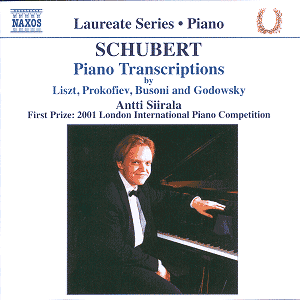Anttii Siirala is a young Finnish pianist who,
in startling fashion, won the International Piano Competition
in London in April 2000 at the age of 20. He replaced an indisposed
finalist at the eleventh hour and went on to carry off the competition
with a performance of Brahms’s 1st Piano Concerto which
was of a depth, stature and sheer mastery that captivated the
jury and public alike at the Royal Festival Hall. Born in Helsinki
in 1979 into a musical family, he made his orchestral debut at
the age of 7 and won the first price in the Juvenalia Chamber
Music Competition at the age of 13. He currently studies at the
Sibelius Academy with Matti Raekallio and Ivari Ilja and he has
received encouragement from Mitsuko Uchida and Murray Perahia.
This disc would seem to be his debut and for
it he has chosen a tricky programme of piano transcriptions of
Schubert. Schubert songs are tricky things to transcribe for piano
solo. Frequently strophic, in their original versions they rely
intensely on the communicative abilities of the singer and their
responsiveness to the nuances of language. The transcriber must
attempt to replace this with something else, without drowning
the original in a sea of showy bravura. Sometimes it helps to
be radical; Schubert’s own instrumental versions (The Trout; Death
and the Maiden) of his songs are radical re-workings rather than
simple transcriptions. The songs on this disc were transcribed
by two famous piano virtuosi, Liszt and Godowsky.
Godowsky famously produced the Chopin transcriptions
for piano left hand. Godowsky was himself a supremely gifted pianist
and his transcriptions often require a prodigious technique from
the performer. In these Schubert transcriptions what is most definitely
required is the art that conceals art; all of the performer’s
skill is required to achieve a performance which eschews much
of the showy bravura of the typical 19th century piano
transcription. Godowsky uses various techniques of elaboration
and changes of register to vary the verses of the songs. Siirala
brings a fine technique to bear on these and gives us some beautifully
subtle performances. But not matter how much he impresses with
his ability to produce a seamless legato line for the melody line,
whilst embedded in a web of piano counterpoint, I still missed
the immediacy of the sound of Fischer-Dieskau and Gerald Moore.
Perhaps what I missed most from the pianism in these performances
was a sense of élan, of the pianist enjoying the complexities
for their own sake. Poetical and beautiful these performances
may be, but they also sound just a shade dutiful.
This is true also of the Liszt performances,
but here Liszt is more prone to include showier elements and in
the Winterreise transcription he is more radical, combining the
transcriptions of Der stürmische Morgen and Im
Dorfe into one single piece to provide the contrast and the
sense of drama that is lacking when the words missed out. Siirala
has a nice sense of characterisation in the Erlkönig
transcription and manages to generate a fine sense of excitement
and tragedy – so much so that I almost managed to accept this
as a work in its own right.
If I have harped on about the lack of words,
it is because Schubert’s subtle art of song is difficult to render
on a solo piano, but the attempt has been made by some of the
finest transcribers and it is always worth hearing the results
in the hands of such a fine pianist as Siirala.
We are apt to forget nowadays that Prokofiev
was also a fine pianist. In fact, he was better known in America
as a performer than a composer. And it is for his recital tours
that he created the charming sequence of Schubert waltzes. Prokofiev
the composer rarely appears, but Siirala makes a fine case for
these lovely works.
Busoni was less happy with the early Overture,
he does not manage to spin gold out of straw. His too literal
approach to the transcription means that too often we notice the
thickness and sheer clunkiness of Schubert’s work.
The last work on the disc is Godowsky’s Passacaglia;
44 variations, cadenza and fugue on the opening of Schubert's
Unfinished Symphony. Composed in 1927 this is surely Godowsky's
masterpiece, a sombre and magnificent tribute written on the centenary
of Schubert's death. It was played by Simon Barere, considered
by Bolet and playfully dismissed by Horowitz as impossible. Freed
from the restraints of transcription, Godowsky produces a work
of power and depth. It journeys from Lisztian bravura through
Regerian harmony and passages reminiscent of Rachmaninov and requires
considerable pianistic resources. Siirala responds with a pianism
fully equal to Godowsky’s demands. If his performance does not
always completely plumb the depths, he is very responsive and
this creditable performance is highly recommendable in a small
market.
Robert Hugill
see also review
by Colin Clarke
